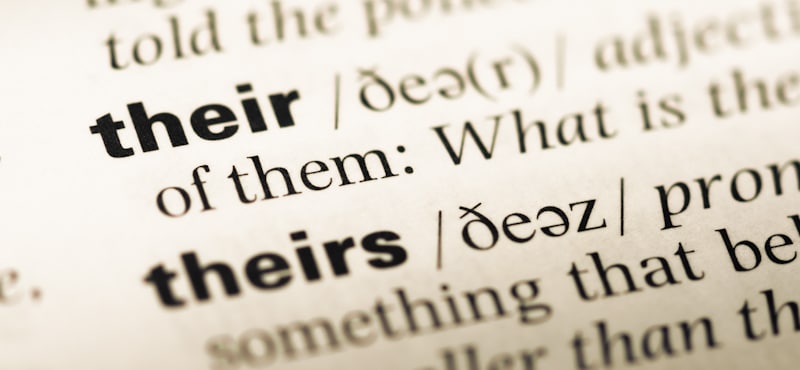Once learned in kindergarten, the famous English rule: “I before E, except after C” can get a little mixed up with time. For this reason, this article will explore the terms “their” and “thier,” main differences, and the right word to use.
According to English grammar and spelling, the correct term to use is “their.” Meanwhile, neither in English grammar nor vocabulary, the word “thier” appears. It does not exist but instead is a misspelling of the word “their.”
Why it happens
When people write “thier,” The intention is probably to refer to the third person pronoun of “they.” but it should be rightly spelled for the whole idea to be transmitted, and the receiver understands well what is said. The word “their” can be used for singular cases too, although mainly in informal settings, as a way to avoid specifying gender.
Examples:
- One must choose their friends wisely. They will travel life with you.
- Judy, Javi, and Juliana said their dog was afraid of heights.
- Wow! Someone left their computer and phone charger in the cafeteria this morning.
- Really? I thought they had postponed their camping trip due to weather issues.
- The graduating class will have their prom trip at Palma Real in the Dominican Republic.
According to the Meriam Webster Dictionary, whenever the term “their” appears in written material, it refers to what it relates or belongs to. Additionally, it is an action performed by things, animals, or people. It declares the possession of something by someone.

Is The Word “Their” Capitalized?
Following are the occasions when the word “their” should be capitalized:
A) At the beginning of a sentence.
This occasion responds to the grammar rule that states one should always capitalize the first word that introduces a complete thought in a written sentence.
For example:
- Their problem is not knowing how to put their feelings into words.
- Their level of English proficiency has surpassed the average student.
- Their trip to the supermarket ended up being a three-hour excursion rather than just thirty minutes.
In the above sentences, the word “their” indicates ownership; of a problem, of an English proficiency level, of a trip. In all three cases, the term “their” introduces the reader to an idea, a complete thought. For this reason, it should be in capital letters.
B) If it is part of a proper noun.
This case applies whenever writing about a literary work or an art piece.
For example:
- So far, Michael’s favorite movie has been “Their Last Dance.”
- Isaiah Ottenwalder was the author of “Their kid, Not Mine.”
- Julia, though afraid, read the poem “Walking Down Their Hood” to the whole class.
- Alex has looped the song “Drawing On Their Thoughts” for the last three days.
- Wendy Pennington, the Canadian activist, became famous for her essay titled “Theirs the Damage; Ours the Problem.”
The five example cases above used the term “their” within a title, a specific work of art, a literary piece, a song, a poem, or a movie. In these cases, the word “their” claims ownership by third parties.
Within A Title: Words That Shouldn’t Be Capitalized
According to most grammar and style guides, within a title, there are some words that one shouldn’t capitalize.
Following are those cases:
- Prepositions (over, at, by, etc.)
- Articles (the, a, an)
- Coordinating conjunctions (but, for, and, yet,)
Therefore, whenever writing a title that includes either the word “oval” or “ellipse,” make sure you understand the rules that apply in those cases so that your writing piece is grammatically correct.
For example:
- “Meeting at Their Secret Place” is the title of his favorite rock song.
- Alice explained “Apart yet Always on Their Mind” is a satire of modern relationships.
- “Fun Times Over Their Roof” won three EMMY awards.
- Jesse and Tai became pals at the book club when they started the series “Their Butler for an Evening.”
“Their” Used As A Singular Pronoun
As mentioned before, the word “their” is a pronoun that indicates possession. Although people generally use it to refer to the third person in plural cases, it is grammatically acceptable to use it when referring to “his” or “her” where the writer does not want to specify gender.
For example:
- Be good to your siblings, and their hearts will be grateful.
- If a driver uses their turn signals precisely, you will know they have learned the rules well.
- Each swimmer will be assigned a number when their turn arrives.
- Someone that might have seen the fight could give their opinion to the press.
- Anyone can call themselves savvy until their reputation is at stake.
In all five cases above, the word “their” refers to a person, an individual that owns: turn signals, an opinion, a position turn, and reputation. However, even if the individual is perceived as being the subject of the complete thought, the sentences have an impersonal, generic tone. In cases where one doesn’t want to specify that someone, in particular, does the action but instead wants to make a general statement, then the word “their” is used as a singular pronoun.

Term “Their” In Sentences:
- One can perceive their body language and posture when looking at the mirror.
- He said “forever,” now riding alone past their street.
- Halle and Stan received their first golden package at their new home.
- McGregor tries to mow their lawn every Monday; however, today was a holiday.
- I don’t know if someone can master their emotions until something random occurs.
- Curly-haired people know their hair reacts differently even when using the same products.
- Georgina, Albert, and Mae decided to take their problem upstairs.
- The lightning in this room makes it easier to watch their art exposition.
- Emilia said their plane would land five hours later than planned.
- Canadians brag about the fact that their maple syrup is the best one.
- If you want to talk to them about your concerns, ask when their closest free time is available.
- Karate players know their time for practice is an essential part of becoming a professional.
- Aestheticians have learned to understand their clients’ faces.
- Amber, Eloise, and Dante said they would be enrolling in their favorite teacher’s archery class.
- If you find someone who can print the sign in bold letters, please ask for their design prices.
- Your neighbor said their mango tree has fresh fruit for the summer.
- Fabiano’s family will arrive soon; their road trip started an hour ago.
- Each of the travelers received their pre-cooked meal at 12:30 p.m.
- One can track their flight trip on the tiny screen in front of their seats.
- Hemmingway and Tulsen tried to decode their friend’s message, but both failed on the attempt.
Conclusion
In conclusion, the correct term to use when referring to the third person plural possessive is the word “their” because the word “thier” does not exist in the English vocabulary and is instead a misspelling of the word “their.” Sometimes the term is used when the writer doesn’t want to specify the gender of the subject doing an action.
There are occasions where one should capitalize the word “their.” Those cases are: when it is the first word in a sentence, introducing the whole idea; when it’s part of a proper title, be it a literary work, an art piece, or another official heading.
Finally, some titles include the word “their,” but one should not capitalize articles, prepositions, or coordinating conjunctions within the title, as it is not proper. It is best to consider the rules and examples when experiencing doubts concerning a word’s spelling.
Shawn Manaher is the founder and CEO of The Content Authority. He’s one part content manager, one part writing ninja organizer, and two parts leader of top content creators. You don’t even want to know what he calls pancakes.

